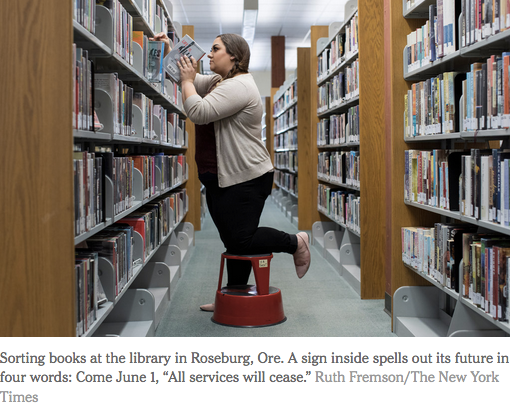ROSEBURG, Ore. — Inside the big wood-paneled downtown library here, a sign spells out the future in four words. Come June 1, “All services will cease.”
For generations in America, small cities like this declared their optimism and civic purpose with grand libraries that rose above the clutter of daily life and commerce. But last fall, Douglas County residents voted down a ballot measure that would have added about $6 a month to the tax bill on a median-priced home and saved the libraries from a funding crisis. So this spring, it has been lights out, one by one, for the system’s 11 branches. The Roseburg central library here is the last to go.
“We pay enough taxes,” said Zach Holly, an auto repair worker in a shop a few blocks from the library who said his vote against the tax was not about libraries at all, but government waste. “I vote against taxes, across the board,” he said.
An instinctive reaction against higher taxes has been stitched into the fabric of America in recent decades, starting with the property tax revolts of the 1970s through the anti-tax orthodoxy expressed by many conservative members of Congress today. But few places in the nation are seeing the tangled implications of what that means — in real time — more vividly than in southwest Oregon, where a handful of rural counties are showing what happens when citizens push the logic of shrinking government to its extremes.
“The trust is gone from people who are paying the bills,” said Court Boice, a commissioner in Curry County, which borders Douglas. At least four property tax proposals aimed at keeping county services afloat, like the library rescue plan in Douglas, have failed in Curry County over the last decade.
. . .
Demographic and economic changes in this swath of the Pacific Northwest, where thick forests brush down to the rocky Pacific Coast, have given the tax resistance movement its backbone. Retirees who came in recent years for the low housing costs or the conservative political culture have become a major voting bloc. And the tech jobs that are fueling growth in Portland, a three-hour drive north, are mostly just a dream.
But what is even more significant is that for many years, timber-harvesting operations on public lands here paid the bills, and people got used to it. A law passed by Congress in the 1930s specified that a vast swath of forest lands that had passed into corporate hands and back into federal control would be managed for county benefit. But then logging declined, starting in the 1980s and 1990s, as it did across many other parts of the West, and the flood of timber money slowed to a trickle, with only a stunted tax base to pick up the difference. The property tax rate in Curry County is less than a quarter of the statewide average. Douglas County residents pay about 60 percent less than most state residents.




